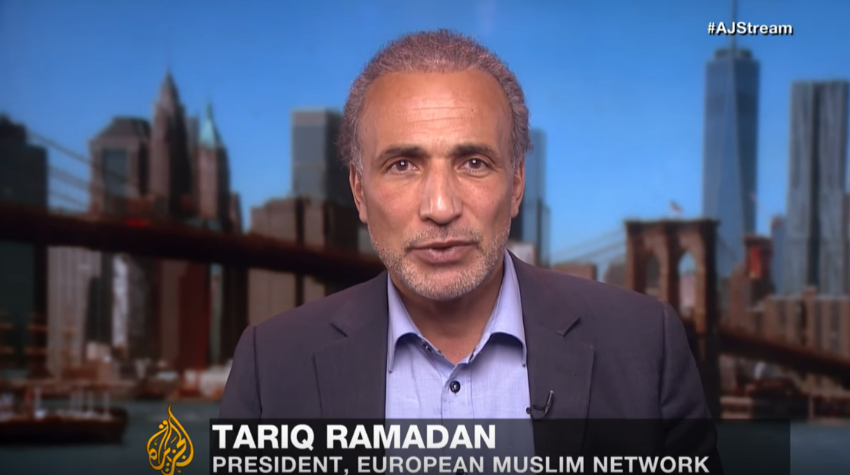This gesture of media solidarity has provoked a wave of protests in Muslim countries and fuelled the debate on the balance between freedom of the media and respect for religion.
One Swiss daily, the Tages-Anzeiger, said the cartoons “were used in the current climate of increasing animosity towards foreigners in Denmark specifically to stoke resentment”.
But Studer pointed out that it was quite clear that the figure of Mohammed depicted in the cartoons was not the same prophet revered by scholars of Islam and the vast majority of Muslims.
“That is an extremely important distinction,” he said. “This Mohammed [in the caricatures] is the one invoked by violent Islamists.”
Renowned Swiss cartoonist Chappatte told swissinfo that absolute positions of principle should be avoided in this affair to allow the real debate on freedom of expression to take place.
“For me, as a newspaper cartoonist, freedom of expression is something visceral. And in Islam, the representation of Mohammed is absolutely forbidden, therefore that also touches the visceral.”
Chappatte cast doubt on the motives behind the original publication of the cartoons by Jyllands-Posten.
“The aim was to depict Mohammed precisely because he is a forbidden subject. It’s as if they were saying to Muslims: ‘Look it’s your taboo! As for me, I am free to do what I want’. One shouldn’t be naïve, it was a provocation.”
“Personally it would not interest me to provoke for the sake of provocation. Drawing is a weapon, but a weapon one should use with care … In this case I find it a bit cheap to test one’s freedom on the back of someone else’s faith,” Chappatte added.
“Newspapers are not obliged to republish offensive material merely because it is controversial,” wrote Britain’s Guardian.
Swiss Muslim intellectual Tariq Ramadan said the situation had to be considered from both points of view.
“We have to be very cautious and to say to Muslims: look, take a critical intellectual distance from this, don’t overreact emotionally, you can just express the fact that it’s against your principles and that’s not the way to use freedom of speech,” he told swissinfo.
“On the other side, I really think that [despite freedom of speech] you have to be respectful towards the people.
“You have to understand that European society has changed, that now you have millions of Muslims living in these countries and they are adding a new sensitivity to European culture.”
Source : swissinfo with agencies
Is it a clash of civilizations or the rumbling of a more complicated culture war that crosses civilizational borders?
At issue is a series of satirical cartoons first published last September in a Danish newspaper depicting the prophet Muhammad in a variety of unflattering guises, including one in which the prophet’s turban is made to look unmistakably like a bomb. Another has him telling his followers that the supply of virgins for suicide martyrs is running low. Accompanying the cartoons was an article criticizing the rising tyranny of self-censorship throughout the western world.
If the editors of Jyllands-Posten were hoping for a civil discussion of the question of free speech, they were quickly disappointed. Protests from Muslim communities throughout Europe and then from the Muslim world steadily mounted. While the editors twice apologized, two Arab states withdrew their ambassadors from Copenhagen and Muslim religious leaders called for a boycott on Danish goods.
But champions of free speech have not backed down. Fanning the flames, several leading European papers reprinted the inflammatory images, including, last week, France Soir in Paris and Die Welt in Berlin. The latter noted in an editorial that Muslims were conspicuously hypocritical about religious insults, citing a recent Syrian television documentary that depicted rabbis as cannibals-a slur that drew no criticism from Muslim scholars.
Reactions to the cartoon scandal do not simply fall on two sides of an increasingly blurred line between the Islamic and western worlds.
Just this week, Tony Blair and his Labor government tried unsuccessfully to enact a law that would have made it a crime to use abusive or insulting words, and not just threatening ones, about any religious group. The watering-down of the bill by a motley assortment of opponents, including many in Blair’s own party, was hailed as a victory for free speech. Still, concerns about the abuses of that freedom, particularly when religion and race are concerned, have been voiced by many prominent non-Muslims in the West. Former President Bill Clinton, for one, directed strong words against the cartoons, calling them “totally outrageous. “
And what about Muslim scholars and leaders living in the West? Tariq Ramadan, the Swiss-born philosopher who is now teaching at Oxford and serving on one of Blair’s commissions on terrorism, says that hard truths need to be told both to hard-core free-speech advocates and to true-believing Muslims. The former need to recognize that Muslims view the depiction of any of their prophets as an affront to their faith. They also have to realize that Muslims come out of cultures unaccustomed to the ridiculing of their religion, even though Ramadan admits that more and more ridiculing of other religions has been happening in the Muslim world.
“On the other side,” Ramadan says, “Muslims should know that for the last three centuries in Europe, since the Enlightenment and Voltaire, there has been an acceptance of the cynical and ironic treatment of religious issues and people. Muslims living here must take a critical distance and realize this is not just against Islam but is part of this culture. “
High-minded sentiments. But Ramadan acknowledges that the current polarized climate makes it unlikely that either side will soon be making any concessions



![PALEXPO : Democratic Engagement & Justice for Palestinians [08/07/2017]](https://tariqramadan.com/english/wp-content/uploads/sites/9/2017/07/Palexpo.png)
![Bristol Festival of Ideas : Conversation with Julian Baggini [24/05/2017]](https://tariqramadan.com/english/wp-content/uploads/sites/9/2017/06/bristol.png)
![Interview on BBC Radio Ulster [06/06/2017]](https://tariqramadan.com/english/wp-content/uploads/sites/9/2017/06/p03nnqlv.jpg)
![Interview on BBC 4 : What do the London attacks have to do with Islam? What is the Muslims’ responsibility?[06/06/2017]](https://tariqramadan.com/english/wp-content/uploads/sites/9/2017/06/bbc.jpg)


Nice post!